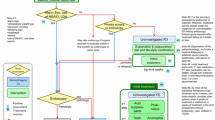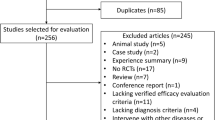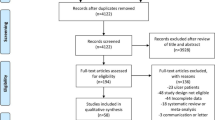Abstract
Objective
The role of gastritis in dyspepsia remains controversial. We aimed to examine the efficacy of rebamipide, a gastric mucosal protective agent, in both organic and functional dyspepsia.
Design
A systematic review and meta-analysis was performed. The following databases were searched using the keywords (“rebamipide” OR “gastroprotective agent*” OR “mucosta”) AND (“dyspepsia” OR “indigestion” OR “gastrointestinal symptoms”): PubMed, Wed of Science, Embase, CINAHL, Cochrane Clinical Trials Register. The primary outcome was dyspepsia or upper GI symptom score improvement. Pooled analysis of the main outcome data were presented as risk ratio (RR) for dichotomous data and standardized mean difference (SMD) for continuous data.
Results
From an initial 248 records, 17 randomised controlled trial (RCT) publications involving 2170 subjects (1224 rebamipide, 946 placebo/control) were included in the final analysis. Twelve RCTs were conducted in subjects with organic dyspepsia (peptic ulcer disease, reflux esophagitis or NSAID-induced gastropathy) and five RCTs were conducted in patients with functional dyspepsia (FD). Overall, dyspepsia symptom improvement was significantly better with rebamipide compared to placebo/control drug (RR 0.77, 95% CI = 0.64–0.93; SMD −0.46, 95% CI = −0.83 to −0.09). Significant symptom improvement was observed both in pooled RR and SMD in subjects with organic dyspepsia (RR 0.72, 95% CI = 0.61–0.86; SMD −0.23, 95% CI = −0.4 to −0.07), while symptom improvement in FD was observed in pooled SMD but not RR (SMD −0.62, 95% CI = −1.16 to −0.08; RR 1.01, 95% CI = 0.71–1.45).
Conclusion
Rebamipide is effective in organic dyspepsia and may improve symptoms in functional dyspepsia.





Similar content being viewed by others
References
Mahadeva S, Goh KL. Epidemiology of functional dyspepsia: a global perspective. World J Gastroenterol. 2006;12:2661–2666.
Ford AC, Marwaha A, Sood R, et al. Global prevalence of, and risk factors for, uninvestigated dyspepsia: a meta-analysis. Gut. 2015;64:1049–1057.
Ford AC, Marwaha A, Lim A, et al. What is the prevalence of clinically significant endoscopic findings in subjects with dyspepsia? Systematic review and meta-analysis. Clin Gastroenterol Hepatol. 2010;8:830-7–837e1-2.
Mahadeva S, Goh KL. Clinically significant endoscopic findings in a multi-ethnic population with uninvestigated dyspepsia. Dig Dis Sci. 2012;57:3205–3212.
Mahadeva S, Raman MC, Ford AC, et al. Gastro-oesophageal reflux is more prevalent in Western dyspeptics: a prospective comparison of British and South-East Asian patients with dyspepsia. Aliment Pharmacol Ther. 2005;21:1483–1490.
Mahadeva S, Ford AC. Clinical and epidemiological differences in functional dyspepsia between the East and the West. Neurogastroenterol Motil. 2016;28:167–174.
Matsumoto Y, Ito M, Kamino D, et al. Relation between histologic gastritis and gastric motility in Japanese patients with functional dyspepsia: evaluation by transabdominal ultrasonography. J Gastroenterol. 2008;43:332–337.
Trespi E, Broglia F, Villani L, et al. Distinct profiles of gastritis in dyspepsia subgroups. Their different clinical responses to gastritis healing after Helicobacter pylori eradication. Scand J Gastroenterol. 1994;29:884–888.
Zaitoun AM. The prevalence of lymphoid follicles in Helicobacter pylori associated gastritis in patients with ulcers and non-ulcer dyspepsia. J Clin Pathol. 1995;48:325–329.
Kyzekove J, Arlt J, Arltova M. Is there any relationship between functional dyspepsia and chronic gastritis associated with Helicobacter pylori infection? Hepatogastroenterology. 2001;48:594–602.
Suzuki H, Moayyedi P. Helicobacter pylori infection in functional dyspepsia. Nat Rev Gastroenterol Hepatol. 2013;10:168–174.
Naylor GM, Gotoda T, Dixon M, et al. Why does Japan have a high incidence of gastric cancer? Comparison of gastritis between UK and Japanese patients. Gut. 2006;55:1545–1552.
Arakawa T, Kobayashi K, Yoshikawa T, et al. Rebamipide: overview of its mechanisms of action and efficacy in mucosal protection and ulcer healing. Dig Dis Sci. 1998;43:5S–13S.
Sun WH, Tsuji S, Tsujii M, et al. Induction of cyclooxygenase-2 in rat gastric mucosa by rebamipide, a mucoprotective agent. J Pharmacol Exp Ther. 2000;295:447–452.
Tabata M, Tomomasa T, Itoh K, et al. Effect of 10% ethanol and sofalcone on prostaglandin E2 content, mucus gel thickness, and experimental ulcers in the stomach of developing rats. Digestion. 1996;57:47–53.
Adachi K, Suetsugu H, Moriyama N, et al. Influence of Helicobacter pylori infection and cetraxate on gastric mucosal blood flow during healing of endoscopic mucosal resection-induced ulcers. J Gastroenterol Hepatol. 2001;16:1211–1216.
Arakawa T, Higuchi K, Fujiwara Y, et al. 15th anniversary of rebamipide: looking ahead to the new mechanisms and new applications. Dig Dis Sci. 2005;50:S3–S11.
Talley NJ, Riff DS, Schwartz H, et al. Double-blind placebo-controlled multicentre studies of rebamipide, a gastroprotective drug, in the treatment of functional dyspepsia with or without Helicobacter pylori infection. Aliment Pharmacol Ther. 2001;15:1603–1611.
Miwa H, Osada T, Nagahara A, et al. Effect of a gastro-protective agent, rebamipide, on symptom improvement in patients with functional dyspepsia: a double-blind placebo-controlled study in Japan. J Gastroenterol Hepatol. 2006;21:1826–1831.
Syam AH, Simadibrata M, Rani A, et al. Rebamipide effect on chronic gastritis in dyspeptic patient: symptoms, endoscopic and histological evaluation. Digestion. 2012;85:156.
Park S, Park SY, Kim YJ, et al. Effects of rebamipide on gastrointestinal symptoms in patients with type 2 diabetes mellitus. Diabetes Metab J. 2016;40:240–247.
Moher D, Liberati A, Tetzlaff J, et al. Preferred reporting items for systematic reviews and meta-analyses: the PRISMA statement. PLoS Med. 2009;6:e1000097.
Johnsen R, Bernersen B, Straume B, et al. Prevalences of endoscopic and histological findings in subjects with and without dyspepsia. BMJ. 1991;302:749–752.
Schubert TT, Schubert AB, Ma CK. Symptoms, gastritis, and Helicobacter pylori in patients referred for endoscopy. Gastrointest Endosc. 1992;38:357–360.
Parente F, Imbesi V, Maconi G, et al. Influence of bacterial CagA status on gastritis, gastric function indices, and pattern of symptoms in H. pylori-positive dyspeptic patients. Am J Gastroenterol. 1998;93:1073–1079.
Higgins JP, Altman DG, Gotzsche PC, et al. The Cochrane collaboration’s tool for assessing risk of bias in randomised trials. BMJ. 2011;343:d5928.
Rew JS, Joo YE, Kim HS, et al. Efficacy of rebamipide maintenance therapy after eradication of Helicobacter pylori infection in patients with chronic gastritis or gastric ulcer. Kor J Gastroenterol. 2000;36:175–184.
Adachi K, Furuta K, Miwa H, et al. A study on the efficacy of rebamipide for patients with proton pump inhibitor-refractory non-erosive reflux disease. Dig Dis Sci. 2012;57:1609–1617.
Hasegawa M, Horiki N, Tanaka K, et al. The efficacy of rebamipide add-on therapy in arthritic patients with COX-2 selective inhibitor-related gastrointestinal events: a prospective, randomized, open-label blinded-endpoint pilot study by the GLORIA study group. Mod Rheumatol. 2013;23:1172–1178.
Kawai T, Yamagishi T, Goto S. Circadian variations of gastrointestinal mucosal damage detected with transnasal endoscopy in apparently healthy subjects treated with low-dose aspirin (ASA) for a short period. J Atheroscler Thromb. 2009;16:155–163.
Mizukami K, Murakami K, Abe T, et al. Aspirin-induced small bowel injuries and the preventive effect of rebamipide. World J Gastroenterol. 2011;17:5117–5122.
Naito Y, Iinuma S, Yagi N, et al. Prevention of indomethacin-induced gastric mucosal injury in helicobacter pylori-negative healthy volunteers: a comparison study rebamipide vs famotidine. J Clin Biochem Nutr. 2008;43:34–40.
Tozawa K, Oshima T, Okugawa T, et al. A randomized, double-blind, placebo-controlled study of rebamipide for gastric mucosal injury taking aspirin with or without clopidogrel. Dig Dis Sci. 2014;59:1885–1890.
Kim HK, Kim JI, Kim JK, et al. Preventive effects of rebamipide on NSAID-induced gastric mucosal injury and reduction of gastric mucosal blood flow in healthy volunteers. Dig Dis Sci. 2007;52:1776–1782.
Kim JH, Park SH, Cho CS, et al. Preventive efficacy and safety of rebamipide in nonsteroidal anti-inflammatory drug-induced mucosal toxicity. Gut Liver. 2014;8:371–379.
Du Y, Li Z, Zhan X, et al. Anti-inflammatory effects of rebamipide according to Helicobacter pylori status in patients with chronic erosive gastritis: a randomized sucralfate-controlled multicenter trial in China-STARS study. Dig Dis Sci. 2008;53:2886–2895.
Han X, Jiang K, Wang B, et al. Effect of rebamipide on the premalignant progression of chronic gastritis: a randomized controlled study. Clin Drug Investig. 2015;35:665–673.
Seearamroongruang T, Chunlertrith K, Mairiang P, et al. Effect of rebamipide combined with omeprazole on symptom improvement in non-helicobacter pylori gastritis. Thai J Gastroenterol. 2009;10:82–90.
Gagliano-Juca T, Moreno RA, Zaminelli T, et al. Rebamipide does not protect against naproxen-induced gastric damage: a randomized double-blind controlled trial. BMC Gastroenterol. 2016;16:58.
Park SH, Cho CS, Lee OY, et al. Comparison of prevention of NSAID-induced gastrointestinal complications by rebamipide and misoprostol: a randomized, multicenter, controlled trial-STORM STUDY. J Clin Biochem Nutr. 2007;40:148–155.
Song KH, Lee YC, Fan DM, et al. Healing effects of rebamipide and omeprazole in Helicobacter pylori-positive gastric ulcer patients after eradication therapy: a randomized double-blind, multinational, multi-institutional comparative study. Digestion. 2011;84:221–229.
Hong SJ, Park SH, Moon JS, et al. The benefits of combination therapy with esomeprazole and rebamipide in symptom improvement in reflux esophagitis: an international multicenter study. Gut Liver. 2016;10:910–916.
Kamada T, Sato M, Tokutomi T, et al. Rebamipide improves chronic inflammation in the lesser curvature of the corpus after Helicobacter pylori eradication: a multicenter study. Biomed Res Int. 2015;2015:865146.
Jin X, Li YM. Systematic review and meta-analysis from Chinese literature: the association between Helicobacter pylori eradication and improvement of functional dyspepsia. Helicobacter. 2007;12:541–546.
Moayyedi P, Soo S, Deeks J, et al. Eradication of Helicobacter pylori for non-ulcer dyspepsia. Cochrane Database Syst Rev. 2006. https://doi.org/10.1002/14651858.CD002096.pub4.
Du Y, Bai Y, Xie P, et al. Chronic gastritis in China: a national multi-center survey. BMC Gastroenterol. 2014;14:21.
Moayyedi P, Talley NJ, Fennerty MB, et al. Can the clinical history distinguish between organic and functional dyspepsia? JAMA. 2006;295:1566–1576.
Salas M, Ward A, Caro J. Are proton pump inhibitors the first choice for acute treatment of gastric ulcers? A meta analysis of randomized clinical trials. BMC Gastroenterol. 2002;2:17.
Wang WH, Huang JQ, Zheng GF, et al. Effects of proton-pump inhibitors on functional dyspepsia: a meta-analysis of randomized placebo-controlled trials. Clin Gastroenterol Hepatol. 2007;5:178–185. (quiz 140).
Thomson AB, Sauve MD, Kassam N, et al. Safety of the long-term use of proton pump inhibitors. World J Gastroenterol. 2010;16:2323–2330.
Acknowledgments
MPT was a recipient of a University of Malaya Grand Challenge fund which also funded the salary of MHJ (GC002-14HTM).
Author information
Authors and Affiliations
Contributions
SM planned the study, contributed to data collection, and drafted the manuscript. MHJ and SZS performed data collection and preliminary data analysis. MPT planned the study and performed data collection. SR performed final data analysis and contributed to the drafting of the manuscript. All authors agreed on the final draft of the manuscript.
Corresponding author
Ethics declarations
Conflict of interest
The authors declared that they have no conflicts of interest.
Electronic supplementary material
Below is the link to the electronic supplementary material.

Fig. 6
Funnel plot demonstrating pooled analysis for RCT studies with continuous outcomes for dyspepsia based on symptom duration ≤ 4 weeks and > 4 weeks (JPEG 111 kb)

Fig. 7
Funnel plot demonstrating pooled analysis for RCT studies with categorical outcomes for dyspepsia based on various UGI symptom scales (JPEG 135 kb)

Fig. 8
Funnel plot demonstrating pooled analysis for RCT studies with categorical outcomes for dyspepsia based on placebo compared with active drug control (JPEG 109 kb)
Rights and permissions
About this article
Cite this article
Jaafar, M.H., Safi, S.Z., Tan, MP. et al. Efficacy of Rebamipide in Organic and Functional Dyspepsia: A Systematic Review and Meta-Analysis. Dig Dis Sci 63, 1250–1260 (2018). https://doi.org/10.1007/s10620-017-4871-9
Received:
Accepted:
Published:
Issue Date:
DOI: https://doi.org/10.1007/s10620-017-4871-9




